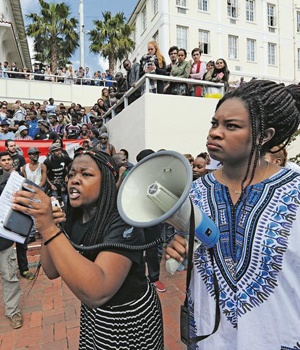
Two decades on, the time we borrowed from that postponement is vanishing. A battle for the soul of South Africa is brewing, and nowhere is it raging more fiercely than on the campuses of South African universities.
But the people leading our universities are failing to rise to the occasion. Instead of encouraging important debates about race, decolonisation and economic justice, they seem intent on suppressing and silencing the exact conversations they should be leading. Worse still, their default response to student criticism seems to be “suspend, ban, intimidate”.
By “debate”, I don’t mean a “gentlemanly” exchange of views followed by tea and scones. The debate we need to have in South Africa is loud, multilingual, fractious and unpredictable. It involves protest, song, dance and speech.
This is why the language question is such an important one. Not only does it affect teaching and learning, it also influences how grievances can be tabled.
What is needed is a commitment to focusing the lived experience of poor black students and addressing their plight as a matter of urgency. This starts with an end to repressive responses to their legitimate concerns.
“Formerly white” universities must have the humility to realise that poor black students have something to teach them and that they should enter a conversation with these students ready to listen to – and act decisively on – their demands.
In this regard, the hypocrisy of some vice-chancellors is disturbing. It astonishes me that many of these mock-messianic figures have enough time to publish odes on “fixing” South Africa, while failing to confront the very serious problems right under their noses.
University of Free State rector Jonathan Jansen’s misguided version of “mercy” seems only to apply to white students who feed urine to black cleaners. Black students who dare to challenge his status as the poor man’s Desmond Tutu are hounded off his campus and branded as “thugs”.
Wits University vice-chancellor Adam Habib seems to be singing from the same hymn book. His recent failed attempt to ban the Economic Freedom Fighters from Wits is a textbook example of the kind of leadership he spends much of his life bemoaning on nightly news bulletins.
Mass suspensions and the banning of political organisations are tactics eerily reminiscent of a bygone era. Earlier this year, Wits pleaded poverty in the student funding crisis.
How then can it find the necessary funds to wrongfully repress student activity and unsuccessfully defend itself in court?
How can these institutions justify excessive fee increases and unduly conservative fiscal planning in an era of such dire desperation while calling on government to “address inequality”?
Here’s the problem: no amount of bureaucratic manoeuvring is going to end the anger of students being failed by the university system.
Instead of shifting the debate to the methods of protest of an often-desperate minority of students, universities should be engaging with the sources of their desperation. Can any of us really dictate to a student living in a cemetery how they should “air their concerns”?
The blame should not lie solely at the door of universities.
For all its talk, the ANC government has done very little to improve the experience of black students at “formerly white” institutions. Twenty years on, no real solutions have been found for the double crises of insufficient funding and an insufficient supply in higher education.
This is an area where student movements need to become more consistent. While I wholeheartedly support movements like Rhodes Must Fall and Open Stellenbosch, I feel they are comparatively timid in their critique of state power.
The point is simple: if we are unequivocal about the evils of white supremacy, we must be equally firm about the need for corrupt political leaders who entrench it to fall. My hope is that student movements evolve to hold the state as accountable as they do their own institutions.
In this regard, it is interesting that the recent surge in youth activism has come in the vacuum left by the ANC Youth League.
While the league wrangles over positions of power and concerns itself with conferences and “structures”, ordinary students are getting on with the work the league should have done long ago.
No matter how much media attention it gets, the youth league will continue to be irrelevant for as long as it refuses to tackle head-on the questions of decolonisation and corruption among senior ANC leaders.
These times demand cool heads as we wade through painful conversations. But the burden of nonviolence should not fall on students alone.
For example, why are security guards and police not being sent to universities to prevent racism from happening? Why aren’t universities investing resources in protecting black students from the kind of abuse we saw in the Luister documentary?
Why are universities surrounding senate meetings with police dog units and armed guards? We can’t turn a blind eye to the violent racism that exists in our universities in one moment, then decry “violence” when it suits us the next.
Try as we might, we can’t postpone the conversation about the role of the post-apartheid university any longer.
Since the tensions at our universities are symptomatic of deeper social inequalities, we must ensure that campuses role-model the conversations that need to happen across South Africa in an exemplary manner.
The battles raging in our universities are a sign of the end of an interregnal era. How we deal with them may prefigure our ability to cope with bigger challenges on the horizon.
Mpofu-Walsh has completed his MPhilin international relations at Oxford University
Talk to us: Are we in a youth revolution like the one of June 1976?




 Publications
Publications
 Partners
Partners








